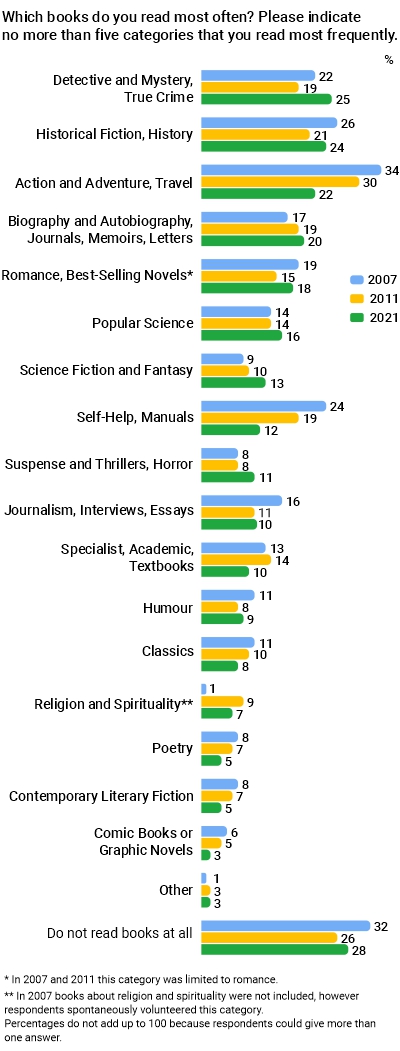32/2021
2021-11-04
Polish Taste in Books
The reading preferences of Polish people are subject to constant change, as can be seen from the differing numbers of respondents indicating particular literary genres over the years. In 2007 and 2011 adventure and travel books were the most popular with readers, but by 2021 interest in them had dropped off (by 8 percentage points on 2011 and 12 points on 2007). Currently, the most frequently indicated types (25%) are crime fiction and true crime. The popularity of self-help books has also diminished with the passage of time: these are now chosen by only 12% of those surveyed (compared to 24% in 2007). The least popular books remain: poetry (5%), contemporary literary fiction (5%) and comic books or graphic novels (only 3%)

|
More on this subject in the CBOS report.
This ‘Current Events and Problems’ survey (375) was conducted using a mixed-mode procedure on a representative sample of named adult residents of Poland, randomly selected from the National Identity Number (PESEL) register.
Respondents independently selected one of the following methods:
– Computer Assisted Personal Interview (CAPI);
– Computer Assisted Telephone Interview (CATI), respondents receiving researchers’ telephone numbers in an introductory letter from CBOS;
– Computer Assisted Web Interview (CAWI), where respondents filled in the online questionnaire independently, gaining access by means of a login and password provided in an introductory letter from CBOS.
– Computer Assisted Personal Interview (CAPI);
– Computer Assisted Telephone Interview (CATI), respondents receiving researchers’ telephone numbers in an introductory letter from CBOS;
– Computer Assisted Web Interview (CAWI), where respondents filled in the online questionnaire independently, gaining access by means of a login and password provided in an introductory letter from CBOS.
In all three cases the questionnaire had the same structure and comprised the same questions. The survey was carried out between 16 – 26 August 2021 inclusive on a sample of 1167 people (62.4% using the CAPI method, 23.5% CATI and 14.1% CAWI).
CBOS has been conducting statutory research using the above procedure since May 2020, stating in each case the percentage of personal, telephone and internet interviews.





